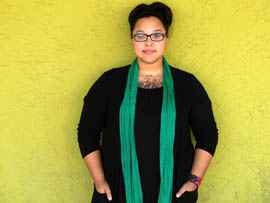Cronkite News has moved to a new home at cronkitenews.azpbs.org. Use this site to search archives from 2011 to May 2015. You can search the new site for current stories.
More Arizona veterans report dealing with military sexual trauma
PHOENIX – Luisa Valdez said she was 18 and new to the Army when knocks awoke her and four male service members pushed her back into her barracks room and onto the bed.
Each man raped her, she said.
“I just remember one after another, after another, after another, after another, and thinking, ‘I can’t win this,’” Valdez said, stifling tears as she described that night in 2002. “The next morning I put my uniform on, showed up at my unit and we all did pushups and crunches together.”
Valdez, who now lives in Phoenix, said she was sexually assaulted three more times while serving with the same unit.
In 2011, there were 3,192 reports of sexual assault in all branches of the armed forces, according to a Department of Defense report.
Valdez, now 29, is one of a growing number of Arizona veterans who identify themselves as survivors of military sexual trauma, often referred to as MST.
Stephanie Dove, MST coordinator at the U.S. Department of Veterans Affairs’ Phoenix Regional Office, said MST includes sexual assault or threatening sexual harassment that occurs during someone’s military service.
About 1,000 men and 1,000 women identified themselves as survivors of MST to the Phoenix VA in 2012. However, Dove said she believes the true number is higher, especially among female veterans.
“I think, unfortunately, a trend among most female veterans is MST, with only one in five women reporting,” she said.
Valdez, who said she joined the Army in part because 40 other members of her family had served, called her placement in an all-male unit as a logistics and supply coordinator a clerical error.
She said she felt pressure to act tough and that she never reported her rapes, mentioning them for the first time to the VA in 2007.
“I remember thinking, ‘You have zero options,’” she said. “You can’t really cry about things when you’re a girl.”
Bonnie Carlson, former professor and associate director of the Arizona State University School of Social Work, said that type of response is typical in the military.
“Reporting any type of victimization or mental health problem really runs counter to military culture, where the emphasis is on being tough and not acknowledging that you have a problem that you need help with,” Carlson said. “It’s especially problematic for women because they often really want to demonstrate that they can play with the big boys.”
Performing her job with less enthusiasm and suffering from insomnia, Valdez said she turned to alcohol to cope.
“It wasn’t uncommon for me to be finished with a shift and be immediately drinking afterwards to kind of drink away the disgustingness of the day,” she said.
Both Carlson and Dove said substance abuse, mostly through alcohol, is closely linked with sexual harassment and MST.
“One of the largest dangers, in terms of not getting treatment, is that over time these symptoms build and intensify if they’re not worked on and treated,” Dove said.
Carlson said symptoms can often coexist, such as substance abuse paired with depression or mental health problems like post-traumatic stress disorder.
Later, Valdez would be diagnosed with PTSD.
“Females are harassed in the military on a minute-to-minute basis; it’s not something that any female is exempt from,” she said.
Valdez said she was eventually transferred to a new unit on the other side of the base, where there were other women.
Dove said that even though she has seen an increase in the number of veterans reporting MST in the past few years, she fears underreporting.
“I think the stigma of reporting and of identifying that this happened and talking about it is reducing, but I think the realistic numbers are higher than that, considering those women who don’t report,” she said.
In response to the increasing number of MST reports, the Department of Defense created the Sexual Assault Prevention and Response (SAPR) Office, which educates military personnel on sexual assault and offers treatment and support to victims.
Maj. Jaycen Miles, who is the SAPR program manager for the Arizona National Guard, said the majority of responsibility to report an assault fell on the victim up until the last decade.
“Now, the responsibility of eradicating sexual assault from the military is not just the leadership’s response but everyone’s responsibility and the soldiers’,” said Miles, who trains soldiers in sexual assault awareness. “We look at it this way: You wouldn’t have any problem looking at your friends drinking and driving.”
Panayiota Bertzikis, executive director of the Boston-based Military Rape Crisis Center, which offers pro bono support for victims, said military efforts to combat MST are still not enough.
“The military will introduce programs but then they’ll never put it into practice,” Bertzikis said. “The perpetrators are still never getting charged and the victims are getting kicked out of the military.”
Staff Sgt. Chad Waltz, a member of the Arizona Air National Guard who worked as the Phoenix-area lead for Vets4Vets, a veteran peer-support network that recently was absorbed by another group, said increased awareness is necessary for change.
“MST is a black eye I think a lot of command hierarchies don’t like to talk about,” he said. “It’s very hard to look at targeting a problem when they haven’t even fully identified a problem to begin with.”
In 2004, Valdez was honorably discharged. She lives with her wife in Phoenix and said she feels a duty to educate others about military sexual trauma.
“We’ve developed this stigma, this patriotism, this culture, that just because they wear the uniform, that they can’t be rapists,” she said. “It’s this culture where we have no blood on our hands, but we do, we very much do, it’s just wrapped in an American flag.”







